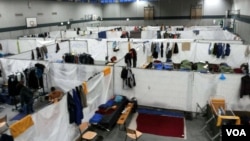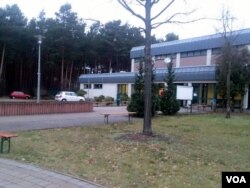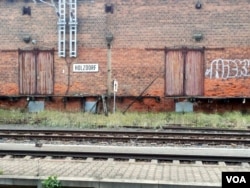"You have to live like this to know how hard it is,” says Mohammad, a 20-year-old Syrian refugee leaning on a card table in a sterile reception room. “You can go out freely, but there is no where to go.”
Deep in eastern Germany’s forestland and miles from the nearest town, Mohammad’s camp houses only single men that all sleep on cots in a gym. It is clean and warm, and residents feel protected by Germany’s military.
But refugees say the relative peace and safety of the camp does little to relieve the isolation that makes them feel more like prisoners than asylum seekers.
“No one comes here to talk to us,” explains Mohammad. “They just come to tell us the rules.”
Camp rules include a no-smoking policy indoors, a regulation refugee camps across Germany have been struggling to enforce. In parts of the Middle East, smoking is so common it is socially unacceptable to ban smoking inside your home.
Complaints, like low-quality or not enough food, go unheard, says Mohammad, and access to medical care is limited. Long nights in a noisy gym have everyone on edge and many of the men have been at the camp for months.
But Mohammad, like the other dozen young men lounging in the reception room, says no matter what happens in Europe, he will not go back. A TV tuned to CNN is on silent, and two young men play table tennis in the foyer. The camp is next to a military base, and surrounded by thick forests.
If he returns to his home in Syria, Mohammad says, several military groups are likely to claim he is required for service, including the army of President Bashar al Assad and the so-called Islamic State group.
“I suffered to get here and I will not go back now,” he said. “When I have a job, and Syria is free of war, then I will go home.”
Protection from neighbors?
When refugees first get to Germany, they have some say in where they go. They pick a city and report to the nearest refugee office to be fingerprinted.
Once fingerprinted, the refugee is in the system and has to stay where he or she is told in order to continue to receive benefits and process the paperwork towards permanent asylum.
New arrivals pick cities based on a number of factors, like where they have friends or where they think they may be able to work.
In recent months, the word on the street is increasingly that western Germany is more refugee-friendly, but eastern Germany processes the paperwork more rapidly, which is why many people came here.
“I do not love the east,” says 22-year-old Wagdi, an aspiring computer technician, as the group of young men in the reception area swells. “But I came here because I heard I could get my documents fast.”
Refugees at this camp say they have heard their German neighbors dislike strangers in general, and there was a small protest when the camp opened a few months ago. Soldiers from next door broke up the demonstration, and some of the protesters later came back to briefly volunteer.
But the refugees say they really know how their neighbors feel, because their very limited interaction with the public is clouded with distrust.
“The shop keepers give us dark looks,” says Maher, a 24-year-old graphic designer from Aleppo. “They are friendly with German people. I can see the difference.”
Gratitude
On one hand, refugees are grateful the German government has chosen to house them, feed them, and offer those among them that qualify, political asylum. But that gratitude is tempered with pragmatism, says Wagdi.
“When I came to Germany, I knew why they opened the door,” he adds. Germany needs workers and young people, he said. “People will all get jobs. If they do not, they may go back.”
Germany also has historic and cultural reasons to be welcoming to refugees, but in the wake of the Paris attacks and heightened tensions in Europe, refugees say their value to society must remain practical or else their welcome will wear out.
Legally, refugees have specific rights laid out by international law, but none of the young men in this camp has been officially declared legal refugees and the process is taking months.
In the meantime, the only thing to do is to wander the camp in the woods or take a bus into the town, which is almost as deserted as the countryside.
“I came here to live,” says Mohammad, "but there are no people.”







